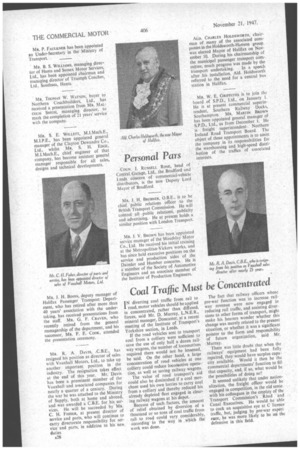Coal Traffic Must be Concentrated
Page 30

If you've noticed an error in this article please click here to report it so we can fix it.
TN diverting coal traffic from rail to I road, motor vehicles should be applied in concentrated, rather than diffused, forces, said Mr. D. Murray, L.N.E.R., mineral manager, Doncaster, at a recent meeting of the Institute of Transport's Yorkshire section, in Leeds.
If the road vehicles sent to transport coal from a colliery were sufficient to • save the use of only half a dozen railway wagons, the number of locomotives required there would not be lessened, he said. On the other hand, a large concentration of road vehicles at one colliery could reduce locomotive operation, as well as saving railwaywagons.
The value of road transport's aid could also be diminished if a coal merchant used his own lorries to carry coal from a colliery and thereby reduced his already depleted fleet engaged in clearing railway wagons at his depot,
Because of such factors, the amount of relief, obtained by diversion of a thousand or so tons of coal traffic from rail to road could vary considerably, according to the WaY in which the work was done.
The fact that railway officers whose pre-war function was to increase railway revenue were now engaged in reducing rail traffic, and assisting diver sions to other forms of transport, might make his hearers wonder whether this change was merely related to the present situation, or whether it was a significant pointer to the form and responsibility of future organization, said Mr. Murray.
There was little doubt that when the railways' equipment had been fully repaired, they would have surplus capacity available. Would it then be the commercial departments' function to fill that capacity, and, if so, what would be the possibilities of doing so?
It seemed unlikely that under nationalization, the freight officer would be engaged in competition, in the old sense. with his colleagues in the employ of the Transport Commission's Road and Canal Executives. He would be able to cock an acquisitive eye at C licence traffic, but, judging by pre-war experivice, he was more likely to be on the defensive in this field.




















































































